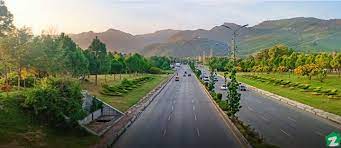Strict enforcement is required against offenders on highways.
ISLAMABAD - The Pakistan highway, built in the 1990s as one of the nation's hallmark projects, provided commuters with a workable traveling option after decades of being bothered by and frustrated by Grand Trunk and other roads.
The Islamabad-Lahore (M-2) and Islamabad-Peshawar (M-1) highways were known for their lack of horns, screaming, and lane breaches because of the specie-raised force that was always on the lookout to ensure effective police.
However, in recent years, particularly the final half of the decade, the situation steadily became worse with the most common infractions on these wonderful roads being speeding, using a phone, lane violations, and incorrect overtaking, which raised a lot of concerns.
Rashid Mahmood, a frequent user of the highways from Islamabad to Lahore and Multan, inquired as to "why strict action is not taken against the offenders."
When I am traveling at the legal limit of 120 kph, I frequently see cars cross in front of me.
Furthermore, he added, it is not just a problem with LTV because other passenger buses occasionally cross me from the far right crossing lane while traveling at the same pace. The majority of these buses display their routes from Lahore and other Punjabi cities to points of interest in Khyber Pakhtunkhwa. Sometimes it gets too dangerous to cross LTVs from the center lane instead than the quickest lane.
Rashid said that the forerunners were irritated by the buses running continually in the center lanes while blowing power horns and using high beams of light. They suddenly shift lanes, startling LTV drivers who are forced to slam on the brakes when they see a huge bus cross the street in the opposite direction. It can sometimes become too dangerous.
When a bus driver was questioned about this way of thinking, he had no good explanation and it appeared that some were merely doing this out of habit, while others were doing it to get more people to use their company's buses.
The only justification he offers for his reckless driving is his desire to be at his destination ahead of time given the fierce rivalry amongst bus operators. However, by doing this, they put other passengers boarding their buses at peril as other commuters.
Javed Chaudhry, a different commuter, claimed that many drivers of large, expensive vehicles and cruisers frequently utilize the fast lanes or the crossing lanes, some while driving slowly and causing others to pass them inadvertently.
He said, "And when you follow them and seek way by flashing headlights or honking, they arrogantly continue to move lethargic and in the same lane." It appears that doing this feeds their ego and sense of grandeur. These selfish sons of wealthy families must also be subdued by the highway police.
Additionally, spotting animal remains on highways, particularly M-2 from Kallar Kahar up to Pindi Bhattian and downward to Lahore, is a severe problem that indicates the wire border securing the highway was damaged at certain locations, allowing animals unrestricted access to the highway.
The center lane is frequently used by cars transporting chicken birds from various cities to Islamabad and Rawalpindi, and they frequently exceed LTV speed restrictions in doing so. Some people drive without using their seat belts, while many more do so without any restrictions.
The Motorway Police, renowned for its alertness and strict adherence to the law, manages traffic by patrolling and setting up speed limit cameras to look for these infractions. They continue to behave and cooperate admirably to help travelers in case of need.
The National Highway and Motorway Police (NHMP) has started the "No More Violations" effort to strictly enforce traffic laws because they may already be aware of such infractions.
Inspector General Motorways Police Khalid Mahmood stated, "We have started employing cutting-edge equipment including spotters, newest speed-checking cameras, surveillance drones, and body-worn cameras to monitor infractions and discipline violators.
He said that the "No More Violations" program is a piece of the five-year plan to update the NHMP. Along with enforcing speed limits, examining current traffic rules, and amending them, via this initiative, we distribute video messages to the informed public on road restrictions and prevent accidents motorway police to the best practices," the program's website states.
According to Khalid Mahmood, "We have also begun employing drone technology to monitor a wide network of highways connecting numerous cities." Pakistan has used drone technology for the first time in the area.
After World Health Organization (WHO) data revealed that more than 30,000 people die in road accidents in Pakistan each year, the IG indicated that more effective steps were being done.
We take care to deploy spotters at various locations, outfit police officers with high-definition cameras to capture infractions, levy steep penalties, and block runaway automobiles at departure points, he added.
He said that variable message signs (VMS) are being installed at the NHMP to monitor non-compliance. Now, the police cars' rear screens would display information about the infraction, the type of vehicles involved, and the number of them, warning violators to stop for the challan.
The driver said, "We are also implementing a standard point system," under which each transgression would result in a motorist receiving a disparaging point, and after a certain amount of negative marks, their license would be canceled. Additionally, we are ensuring that the weight limit for freight carriers is adhered to.
He stated that as of September 27 this year, fines of Rs 3,406,494,123 against 2,236,315 tickets were issued for cars loading 15% of more than allowed, while Rs 67,646,000 fine against 67,385 tickets were issued for vehicles carrying less than 15% of more than allowed.
Additionally, he added, the NHMP has held several Road Safety briefings, awareness and sensitization walks, seminars, and workshops, as well as given commuters leaflets and booklets. Emergency escape gates are also checked on vehicles, and those without them are prohibited from using highways.
